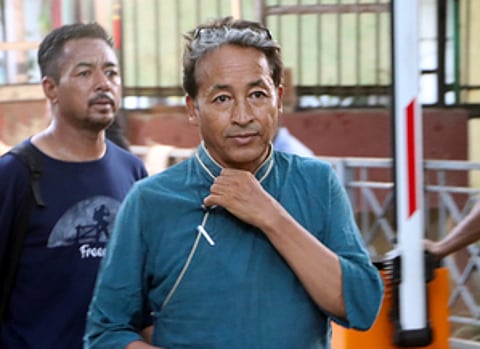Ladakh unrest: How a peaceful region turned into a flashpoint
Sonam Wangchuk’s arrest and broken promises fuel anger in India’s northern frontier

Ladakh is one of India’s most sensitive regions, bordering China. Ladakhis are a peaceful people, tolerant to a fault, and have endured years of state neglect while the glamorous and trouble-prone Kashmir Valley received most of the attention.
So what set this critical region on fire, and who are the actors behind it? According to the Indian government, which currently administers Ladakh from the Centre, it was newly labelled “anti-national” Sonam Wangchuk — 2018 Ramon Magsaysay awardee, climate activist and engineer, and local Ladakhi boy made good — who was also one of the inspirations for the Aamir Khan blockbuster Three Idiots.
Ironically, Wangchuk had welcomed the repeal of Article 370 by the Modi government in Jammu & Kashmir and the reading down of the state into three union territories, including Ladakh, in 2019. At the time, he reflected the hopes of his people, who rejoiced at the change, believing it would preserve their unique culture and fragile ecosystem. But that hope has since evaporated. For the first time in their history, Ladakhis have resorted to violence — burning offices — which led to a brutal crackdown by authorities and the killing of four locals in police firing.
Detained under NSA
Wangchuk is currently detained under the draconian National Security Act and has been transferred to a prison in Jodhpur. A police dossier on his alleged “anti-national” activities includes, incredibly, a climate summit he attended in Pakistan organised by a widely respected newspaper, alongside several other Indians and Indian journalists.
Says a senior security expert: “This wide canvas painting of those who are carrying out peaceful protests — a safety valve in a democracy and allowed by our Constitution — as violent anti-nationals is ridiculous and will prove to be counterproductive. Anyone against a political party is not necessarily against India. Wangchuk’s mode of protest — a hunger strike asking for more autonomy and protection for Ladakh’s fragile ecosystem — is non-violent. How is he an anti-national? And how do these intelligence agencies conveniently find out these damning things about activists once the government decides to go after them?”
These are valid questions, particularly in light of the infamous IT cell of the BJP and the tame media attacking Wangchuk — once a darling of the same groups and frequently invited to their “conclaves” and “think fests.”
Fighting for full statehood
It is easy to demonise Wangchuk as the face of an “anti-national” movement. Yet the inconvenient fact is that Ladakhis are fighting for what they were promised by the government: inclusion in the Sixth Schedule of the Constitution and full statehood for Ladakh, home to more than 300,000 people. They also want to be included in the list of tribal areas that enjoy constitutional protections. Primarily, they fear unchecked tourism and commercial mining will destroy Ladakh’s fragile ecology and water-deficient landscape. The area is a flashpoint between China and India and also borders Pakistan. Talks between the government and Ladakhi leaders over autonomy have dragged on at a snail’s pace, testing the patience of a very tolerant people.
Wangchuk was running a conservation nonprofit whose licence has now been cancelled by the government. He pioneered innovations such as the ice stupa (artificial glaciers to address Himalayan water scarcity), mobile solar-power tents for the Indian Army, and passive solar buildings suited to Ladakh’s harsh climate. He also set up a school and a university to boost local education. These are hardly the actions of a proverbial “anti-national.”
Unrivalled natural beauty
Ladakh has daunting topography and unrivalled natural beauty but suffers from primitive infrastructure and government neglect even in providing basic services. Before his arrest, Wangchuk told reporters, “Governments in a democracy should be sensitive to people’s demands. Good leaders listen to people’s voices.”
The government is set for a round of talks on October 6 with local leaders, but it is unclear if Wangchuk will be part of it given that he is locked up under a draconian law.
The government is mishandling unrest — whether it is Manipur, which has been burning for over three years, Kashmir, or now Ladakh, a part of the country that has never seen unrest before. The only way to deal with local aspirations is to listen to local voices. Kashmir is a prime example, with the lacklustre, powerless Omar Abdullah government having provided mediocre governance and leadership to the region. India’s sensitive border regions deserve better governance — for both the people and national security in a turbulent neighbourhood.




